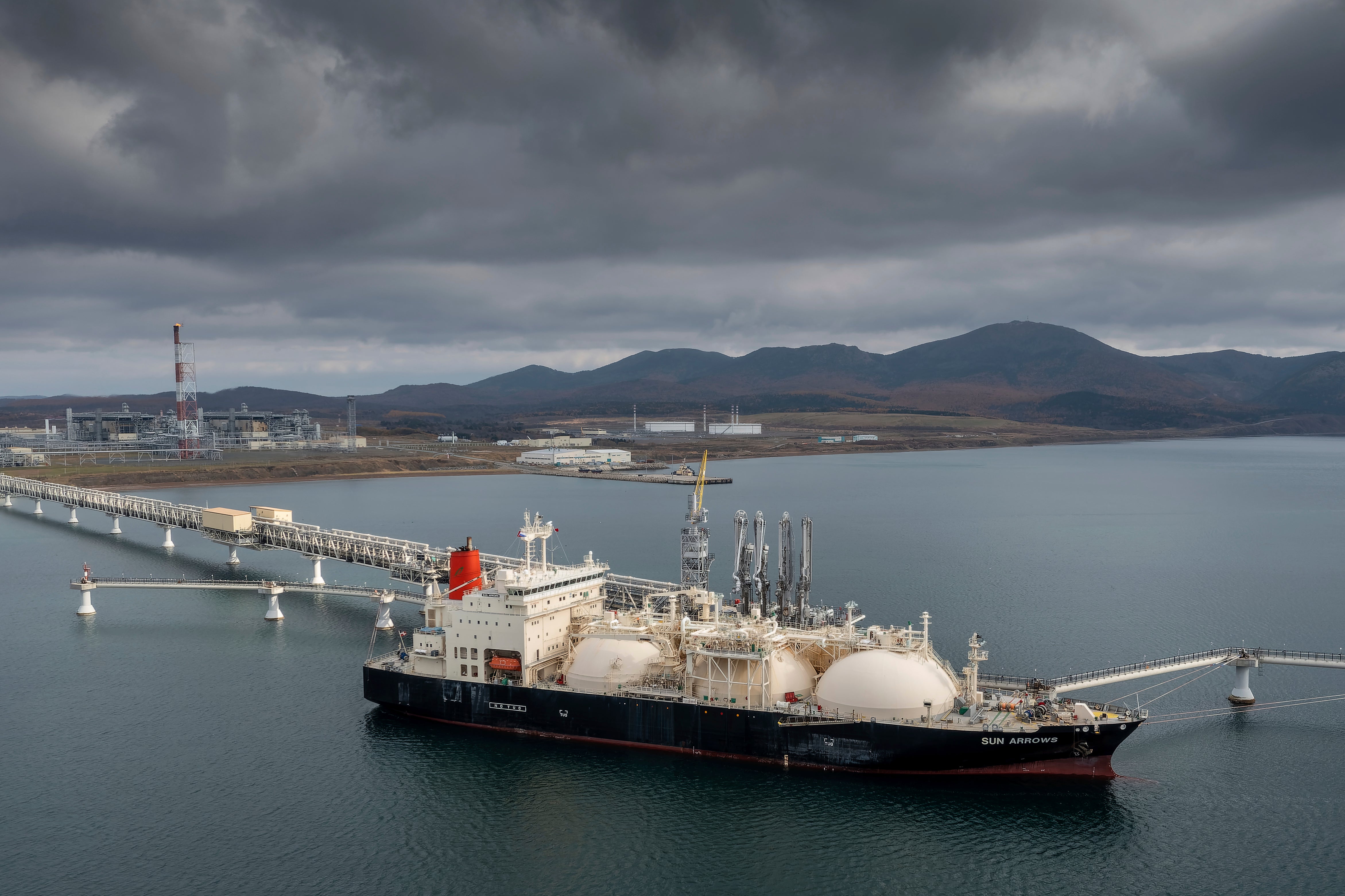How Russian oil is still reaching US, Europe, and other countries sanctioning Moscow
Sanctions are a key weapon touted by Volodymyr Zelensky as a way to throttle Vladimir Putin’s economy, but, as Shweta Sharma explains, Russian oil products are still finding ways to reach Western markets


Russian energy is continuing to flow into the US, member nations of the European Union, and other countries that have imposed the toughest sanctions on Moscow, potentially blunting the sting of sanctions designed to cripple the Kremlin’s ability to finance the war in Ukraine.
While a large number of Western allies have agreed to halt the import of Russian crude and refined oil products as punishment for Vladimir Putin’s invasion, other countries have refused to do so and are taking advantage of the crisis to score major discounts.
India is arguably the prime example of this, with its imports of cheap crude oil from Russia increasing from zero in January and February to a record 950,000 barrels per day in June.
And at the same time, major Indian refiners on the west coast – which is the leading destination for Russian crude – are selling on huge quantities of refined products to the US and Europe, two leading oil analytics firms told The Independent.
Once India has processed the oil and sold it on, it is impossible to say exactly how much of the end product can be traced back to Moscow, but analysts agree that at least a “small percentage” will have started its journey in Russia and ended up in a country that has enacted Ukraine-related sanctions, though not necessarily specific to energy.
Petro-Logistics, a Geneva-based oil trade analytics firm, estimated in a report that 308,000 barrels a day of Indian oil products refined from Russian crude are being exported since the war began in Ukraine.
Of that amount, it estimated that 113,000 barrels per day (37 per cent) are going to Asia, including some countries with sanctions on Russia, and 26,000 barrels per day (8.4 per cent) are going to Europe.
The proportion of India’s exports of clean petroleum products – such as kerosene or diesel – going to Europe rose to 15 per cent this year, up from 13 per cent last year, according to the analyst Kpler, which tracks oil on a vessel-by-vessel basis. The UK now accounts for 3 per cent of India’s exports of clean products, up from 1.4 per cent in 2021.
Kpler said that the scale at which India is now importing Russian oil means it is “highly likely” that at least some of it is ending up in countries that have imposed sanctions on Russia. While June was the peak, over the first eight months of 2022 India’s purchases of Russian oil averaged 460,000 barrels per day. That compares with just 28,000 barrels per day over the same period in 2021, Kpler said.
“Given that Russian crude has accounted for nearly 20 per cent of Indian crude imports in recent months, it seems highly likely that countries that have banned or pivoted away from Russian crude imports are still importing clean products that have been refined from Russian material,” said Kpler’s lead oil analyst, Matthew Smith.
“What is interesting, however, is that the US has a ban in place on Russian energy since April, but is importing all manner of products from Indian refiners,” he added.
On 8 March, US president Joe Biden signed an executive order to ban “the import of Russian oil, liquefied natural gas, and coal to the United States” in order to “deprive President Putin of the economic resources he uses to continue his needless war of choice”, the White House said in a statement.
Speaking to The Independent, Kannan Ramaswamy, an energy sector expert from Arizona State University, agreed that there is a “very good possibility” of Russian oil reaching countries that have ostensibly stopped buying it, and that it would not be a stretch to say that this is being done deliberately in a way that obscures the origins of the cargo.
“We should not be surprised if some of the sanctioned oil reaches the shores of the sanctioning countries, as this would not be the first time that companies and countries have threaded their way carefully to avoid the sanctions trap,” he said. “Although the volume of origin-obfuscated crude is very difficult to determine, it has been proven that countries do have the means to trans-ship fairly sizeable cargos.”
A refinery in Jamnagar belonging to India’s largest business conglomerate, Reliance Industries, is the leading destination for Russian crude oil. The Jamnagar refinery has also accounted for nearly 80 per cent of India’s exports bound for the US – and 70 per cent of those to Europe – this year, Kpler estimated.
Among countries that have imposed sanctions of some kind on Russia – not necessarily on energy – the top importers from India are South Korea, importing 31,000 barrels per day, Singapore, importing 23,000 barrels per day, and the US.
Australia and the Netherlands are also among the top importers of oil products from India.
Mr Smith said that China and India – the largest and third-largest oil importers in the world – are the “biggest beneficiaries of the war with Ukraine”.
“[This] is because they are able to buy Russian crude at a steeply discounted rate,” he said. “India is in a doubly advantageous position, because it can refine that cheap crude and can then send those refined products back into Europe.”
Daniel Gerber, chief executive of Petro-Logistics, told The Independent that it takes a fairly simple analysis to say that at least some Russian crude oil is making its way, via third countries, into countries with some form of sanctions on Russia in place. He said that this conclusion was reached after assessing each specific cargo that discharges in India, including those from Russia.
“The world knows that Russian crude oil is being purchased by Indian refiners,” Mr Gerber said. “Our simple analysis shows that a small percentage of India’s product exports were created by refining Russian crude oil. An even smaller percentage of those product exports may be going to countries with some form of sanctions on Russia (not necessarily energy-related).”
But he acknowledged that it is very difficult, if not impossible, to track the origin of individual barrels (and indeed molecules) of oil after the products have gone through a refinery system and been stored in tanks.
Mr Ramaswamy said the sanctions imposed by the West are a case of “overpromising while under-delivering”, as the intent is not being followed up with robust enforcement. At the same time, he would not dismiss them as having failed.
While lashing out at the West for exhibiting “double standards” in its response to the Ukraine conflict, Denis Alipov, the Russian ambassador to India, said the boom in India-Russia trade was proof that Western sanctions had failed.
“Those in the West who criticise India not just slyly keep silent about the fact that they themselves actively buy Russian energy resources, exempting them from their own illegitimate sanctions, but in doing so explicitly demonstrate their unprincipled position and double standards while claiming otherwise,” Mr Alipov said.
India, which has a long history of pursuing a non-aligned strategy in international politics, has expressed concern at the conflict in Ukraine, but has neither directly criticised Russia for its invasion of Ukraine, nor joined the West in imposing sanctions.
New Delhi has sought to justify its increased purchases of oil, saying it is the job of the government to look out for its own citizens’ interests and that the imports are part of a critical “inflation-management strategy”.
“PM Modi’s instructions were [that] we need to think about our people first,” Indian foreign minister S Jaishankar said when asked about the issue. “If some problem arises in the world, we should not interfere in it. This too is a sort of a dogma. Maybe in 1950-60, we did not have capability. We had our own interests. But now, just a few days back, we have reached No 5 in the world in economy.”
Mr Ramaswamy agreed that Western criticism of India for purchasing more Russian oil was “misplaced”, calling it a classic case of “do what I say but not as I do”.
“Every single Western power has a record of self-serving behaviour at the expense of the common good. It is amazing hypocrisy to expect India to be more ‘cooperative’ than others,” he said.
India’s own economic needs, its history of friendly relations with Russia and its general policy of international non-alignment mean it would be more surprising if New Delhi did not take up the steep discounts on offer from Moscow, he argued.






Join our commenting forum
Join thought-provoking conversations, follow other Independent readers and see their replies
Comments